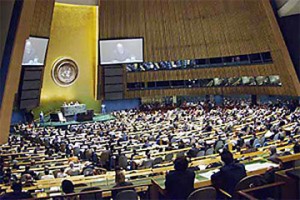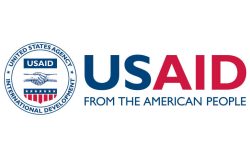Mr President of the General Assembly, Mr Secretary General, Distinguished Represen-tatives Ladies and Gentlemen.
I join with those who have spoken before me, Mr President, in congratulating you on your election to guide the work of this 63rd Assembly, and in commending your predecessor for his stewardship of the Assembly over the past year.
I also take this opportunity to commend the Secretary General and his staff for their continued dedication in advancing the work of the Organisation.
Mr President:
As we meet this week, the global financial system is confronting its sternest test in recent memory. The current crisis is systemic in nature, historic in scale, and global in reach. It comes at a time when the world economy is still wrestling with the most rapid escalation, and the highest real levels, ever recorded in the prices for fuel and food commodities. Together with the world’s belated attention to the devastating economic and social implications of climate change, these developments define the agenda before global institutions and national leaders today. They make the theme for this year’s debate both timely and necessary.

Given the gravity and urgency of the issues before us, we must be careful not to conduct this year’s debate in the customary rhetorical manner. Instead, we must resolve to translate the detailed analysis, lofty statements, and good intentions for which this Assembly has become well known, into concrete actions which the current circumstances demand of us and on which history will judge us.
We must each, as countries approaching the floor to speak, be prepared to account for the pledges we have previously made. We must also be bold enough to embark on a project to achieve real change to the multilateral system. This change must be based on mandates that are relevant, institutions that are accountable, and a context that is increasingly reflective of integration and interconnectedness.
Indeed, I would urge that the theme of the next General Assembly should emphasise accountability and coherence of action on the part of the developed world in matters related to aid, trade and development. Often when taken together the policies of these countries result in a significant net loss of welfare in the developing world and run counter to their declared intentions, for example the achievement of the MDGs by 2015.
Financial Crisis
Mr President:
An episode that manifested itself merely two years ago as a moderate decline in the housing market in some parts of the United States, and that evolved into difficulties for that country’s subprime mortgage market, has now grown into a rapidly deepening systemic financial crisis of global proportions. It is being described as the worst financial crisis since the Great Depression of the 1920s.
Over the past two weeks, the main financial markets have been characterised by prominent institutional failures, widespread flight by investors to quality investments, and unprecedented intervention by national authorities. The cost of the rescue package in the United States alone is estimated at US$700 billion.
The current episode reiterates the critical shortcomings in domestic regulation and supervision that are known to exist, and to failures by market mechanisms for governance and oversight. It also points to fundamental weaknesses in the global financial governance system. There is clear evidence that many of the standards and much of the scrutiny that are applied routinely to smaller countries were not applied to some larger countries which actually pose much greater systemic risk.

The troubles now being faced will inevitably result in the loss of thousands of jobs, as the inevitable consolidation of the financial sector progresses. The situation will exacerbate already depressed business and consumer confidence, and contribute to recession in the developed economies and lower growth prospects in emerging economies. And, it will result in a further tightening of credit, manifested by rising interest rates and increased risk aversion.
Even if they are not fully integrated with the global financial system, small vulnerable economies such as Guyana will bear the full effect of these developments as demand for exports tightens, the cost of capital rises, foreign direct investment becomes scarce, and tourist arrivals and migrant remittances decline. In short, economic growth and poverty reduction efforts will suffer a severe setback and the Millennium Development Goals wiIl become even more elusive.
Food Security
At the same time, crude oil prices rose by 148 per cent during the eighteen months to July of this year. This in turn has contributed to the prices for food commodities, particularly staples such as cereals, rising in some cases by more than 200 per cent during the same period. While there have been some signs in recent weeks of these increases tapering off, and in some cases reversing marginally, the outlook clearly suggests that high energy and food prices are here to stay.
While these increases reflect rapidly increasing demand in some emerging economics, limited productive capacity, and unscheduled interruptions in major production centres, they also reflect a deep underlying relationship with climate change. Specifically, food price increases have also been driven by supply volatility induced by erratic climatic patterns and extreme weather incidents, higher fuel prices and a diversion of food products to the production of biofuels especially as a result of subsidies in the US market. In the future diversion of land to conservation purposes and increased scarcity of water would have an upward impact on food prices.
Without a doubt, increased food prices provide an important opportunity and incentive to farmers and agricultural economies for increased production. However, they also present grave implications for access to food, particularly by the poor, and by extension, for key nutrition and health indicators among our populations.
If we are to accept published statistics that the global demand for food is expected to double by 2030, then measures for the short and longer term supply including increased productivity and transfer of technology must be adopted and implemented urgently by the international community to stave off widespread starvation.
More importantly, the international community must acknowledge the inextricable link between agricultural development and food security. The World Bank has warned that priority must be given to the agricultural sector in the development process if the Millennium Development Goals of halving extreme poverty and hunger by 2015 are to be realised. Some 75% of the world’s extremely poor people live in rural areas and depend directly or indirectly on agriculture for their livelihood. There is thus a comparative advantage for agriculture in relation to should be heading the design of mechanisms as we forge a post-Kyoto climate agreement.
In Guyana, despite the fact that 85% of our people live below sea level and are already suffering from changing weather patterns and rising water levels we do not want to just complain about climate change. Instead, we want to partner with others to create a solution – and as part of this, we are ready to discuss placing almost our entire rainforest in the service of the world if the right economic incentives are created, and if‘this can be done in a way which neither trades sovereignty over our forest or restricts the legitimate development aspirations of our people.
International Trade
Mr President:
In our international economic relations, developing countries have been advocating a more equitable trading regime. The fact that developing countries, particularly those with small populations and economies in transition, cannot compete with the economic giants of the world especially in the face of subsidies has long been established by studies done by the World Bank, the Commonwealth and others. As such, the principle of special and differential treatment for such countries has been a constant feature in the discourse on multilateral trade arrangements. While the issue is being disclosed in the WTO, some regional blocs are insisting on their own definition of what special and differential treatment should be, and this is being done in a bilateral context
Mr. President, the African Caribbean and Pacific (ACP) countries are currently negotiating an Economic Partnership Agreement (EP A) with the Europe Union. This agreement may fundamentally affect development in our societies and jeopardise our future negotiating positions at the WTO. The European Commission has threatened to impose tariffs under the GSP on our exports if we do not sign up to Agreements that reflect the EU’s model of WTO compatibility even though the model includes issues that have been removed from the WTO agenda – the so called Singapore issues. These Agreements will also seriously prejudice our negotiations with other countries and may jeopardise the future of our integration movement.
The exploitation of the EU superior negotiating strength and the use of threats to get countries to sign are ironically how the EU hopes to start this partnership under the EPA. What is particularly irksome is that we are incessantly lectured by the same group of countries that national consultations and working with civil society are essential hallmarks of good governance. Yet when the same civil society opposes the EP A on the ground that it is not sufficiently developmental in nature, we are told to ignore them – that they are complainers. I wonder if the leaders of these countries know, or care about, what is being done in their name. Even at this late hour I wish to plead with the EU leaders to review these agreements before they irretrievably harm the good historic relations that have existed between the ACP and the EU.
Reform of Inter-national Institutions
Mr President:
This brings me to the matter of the much-needed reform of our multilateral institutions. This matter has been on the agenda for some time, but it would be fair to say that it has progressed slowly and its results have been few and difficult to observe.
In the case of the reform of the international financial institutions, I fear that much of this reform is driven not out of a need to respond to current world reality but out of fear that sovereign wealth funds, regional financial arrangements, and new bilateral sources of development financing would make some organisations obsolete. Instead, the reform agenda has to be driven by what is necessary for good global governance and by the need for steady and demonstrable improvement in the lives of all of the peoples of the world.
I believe that the reforms must be pursued along certain pre-defined principles. Firstly, the institutions must have new mandates that are relevant to current circumstances, and they must have at their disposal tools to discharge these mandates effectively. Secondly, the institutions must have legitimacy and be reflective of equitable representation of their membership.
Thirdly, in the discharge of their functions, they must demonstrate flexibility and responsiveness. And, fourthly, they must display the highest standards of accountability and transparency.
As I alluded to earlier, I believe that limitations in the mandate and functioning of the international financial institutions were a contributory factor in the current financial crisis. The mandate of the International Monetary Fund should explicitly be the preservation of systemic financial stability as a global public good. In addition, the use of passive surveillance as a general instrument, and conditionality-based lending among the more vulnerable members, has clearly proven to be ineffective. This is so not least because the incentives associated with conditionality-based lending are almost invariably never applicable to countries of systemic importance, and there exist no mechanisms to encourage larger countries to be responsive to policy advice.
Likewise, the World Bank should have a revised mandate that focuses on certain key development challenges being faced, such as protection of the environment, clean energy, and certain aspects of poverty reduction, instead of attempting to address every development challenge and undermining its own effectiveness.
In addition, more needs to be done to democratise the institutions align the interests of the management and staff with those of the countries they serve, and make them more accountable to the membership.
In like manner, a more democratic and reformed United Nations Organisation will be better placed to play a central role in the multilateral system to serve in the interest of the international community as a whole, whether in relation to its peace and security mandates. the protection of fundamental rights, or to the promotion of development.
Within the Commonwealth, Heads of Government have developed a set of principles and guidelines which should underpin the reform of the international institutions. Among their recommendations is a call for a conference along the lines of Bretton Woods to lead the way in determining the future of the international financial institutions. I trust that these principles and guidelines will be fully embraced.
Let me conclude by saying that Guyana remains committed to the principle of multilateralism and to the principles and purposes of the United Nations Charter. Especially sacrosanct for us is the inviolability of and respect for the territorial integrity and sovereignty of all Member States and the resolution of disputes by peaceful means.
I wish this 63rd Assembly every success.
Mr President, I thank you.









